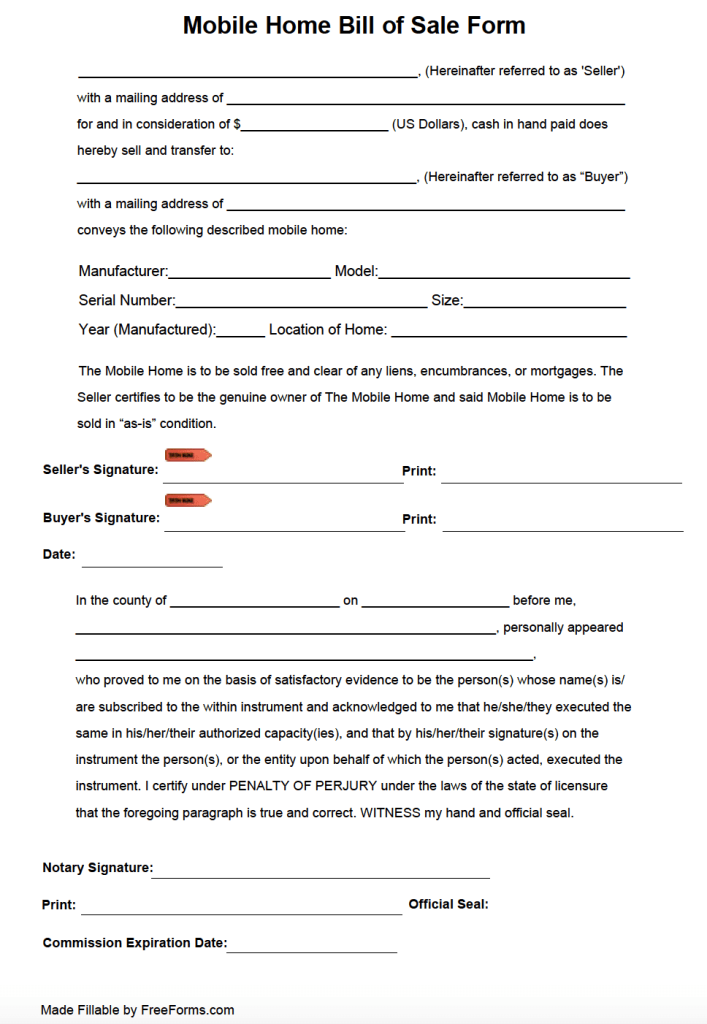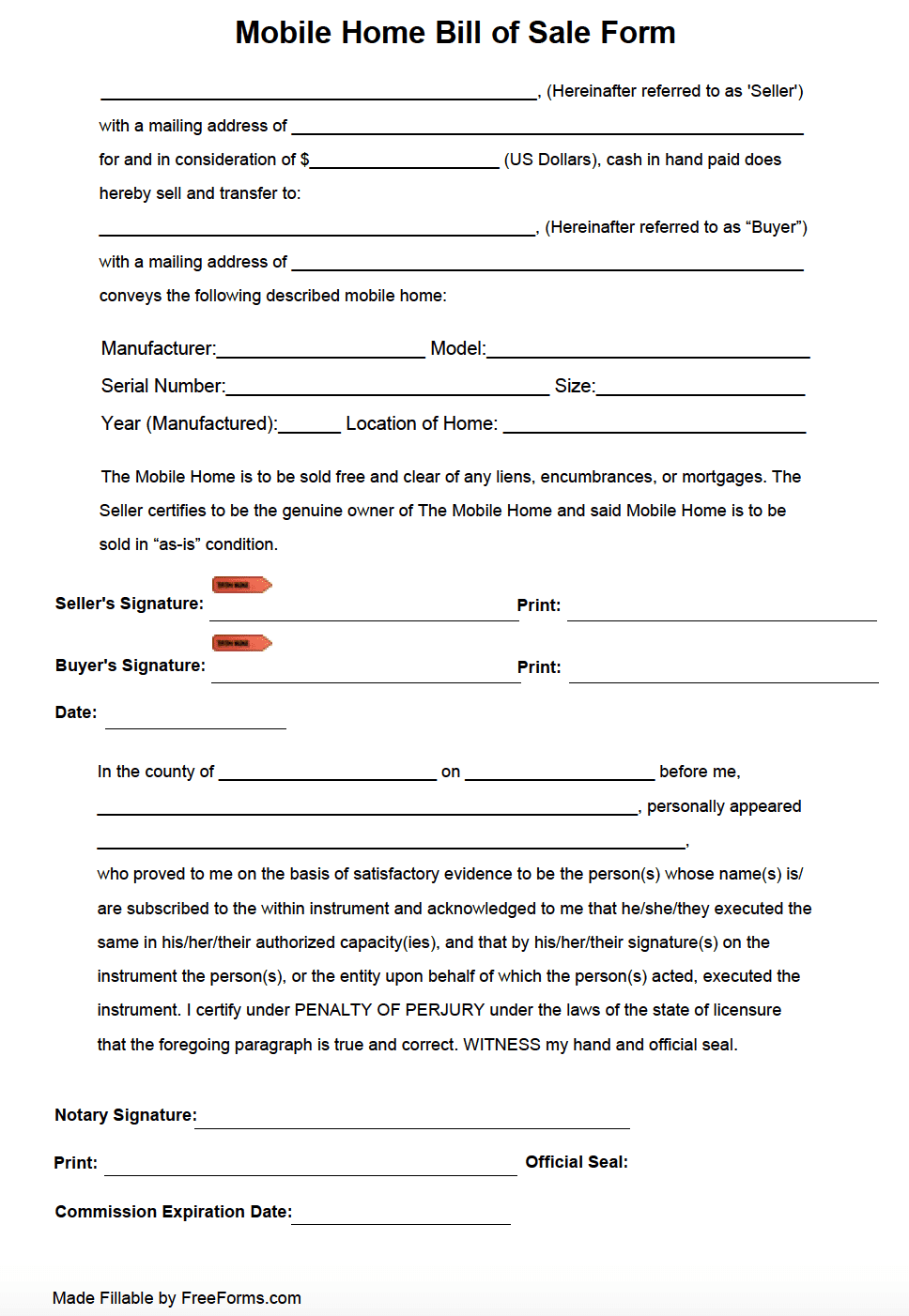Why do I need a Bill of Sale?
Incorporating a Bill of Sale to provide a material transcript of the sale of a mobile home is an effective way to produce a physical record of the transaction that can serve as sufficient proof of the purchase. Taking the time and effort to furnish and complete the form can be advantageous once the time comes to register or transfer the title. Additionally, the form can come in handy should there be any disagreements after the fact between the buyer or seller or if any liabilities occurring with the use of the property should arise. It can also be utilized as a paper record to support evidence of purchase price for consideration for tax purposes.
How to Sell a Mobile Home
When selling your manufactured home, determine if you wish to sell the mobile home along with the land it currently sits upon or simply the home itself. If you do not own or wish to sell the land, the sale will closely resemble selling a motor vehicle. If you desire to sell it along with the land, the action will more closely mirror a real estate sale. If the home resides in a mobile home park, you will want to review any paperwork you may have signed initially and closely examine the rules and regulations governing your right to sell within the park.
Step 1 – Figure a Workable Asking Price for the Mobile Home
When selling a manufactured home, you will want to evaluate a fair asking price to promote. If you are selling the home alone with no land attached to the sale, a viable option is to inquire about reasonable value from Nada Guides. The evaluation has a fee, although it can be significantly cheaper than having it professionally appraised. The alternative of having it appraised by a certified appraisal expert can be somewhat more expensive but may pay off in the long run. Should it be sold along with the land, this may be a requirement, as many states mandate a certified appraisal when selling real estate. Once you have an assessment of its worth, you will then want to perform diligent market research on comparable homes for sale and use this to estimate an acceptable asking price.
Step 2 – Decide if You Want a Sales Agent
You can advertise the sale of your mobile home in many ways. One thing to consider if your home resides in a mobile home park is to speak with the management to discuss if they would be interested in purchasing. Remember, they may not be looking to pay what you are asking. Despite this, it doesn’t hurt to ask to keep your options open, as in the case you are selling just the home itself, the expenses involved in moving a manufactured home can be expensive. You will want to decide whether to contact a broker or sales agent to sell the home for you. The cost of an agent can be up to 10% of the selling price, so consider it before you proceed. If you wish to utilize a sales agent, hire one specializing in selling mobile homes, as conducting the sale may require specific certification and expertise.
Step 3 – Create an Effective Advertisement
If you sell it yourself, you first want to make necessary repairs and thoroughly clean the unit. Next, you will want to create a description and take multiple photos to represent the home best. Ensure to include the year it was built, the size, square footage, manufacturer, style, included appliances, roof type, contact information, and desired payment method (generally cash or owner-financing). When taking photographs, choose an ideal day to capture the best way to display your home in a well-lit environment. Capture photos of the exterior and interior in all rooms and any fixtures, appliances, or amenities you wish to highlight.
Step 4 – Promote the Sale of the Manufactured Home
There are many avenues to advertise a manufactured home, starting with the property the home is on. Display a prominent ‘For Sale By Owner’ sign in plain view on or around the mobile home, including a specs sheet nearby for interested buyers. You can advertise your description in the newspaper or a local classifieds circulation. You can also post your ad to online classifieds such as Craigslist or Trulia or get a quote from an online mobile home reseller such as Mobile Home Pros or EZ Homes.
Step 5 – Show the Home and Negotiate the Terms of the Sale
Once potential buyers are interested in the unit, encourage them to view the home. When showing your manufactured home, give yourself time to spruce up the look for a possible buyer. Ensure the unit is open to natural light, clean, and odor-free. When showing any home, it is a good idea to bake cookies and present a welcoming environment by placing fresh flowers in a vase to make it more inviting. When there is an indication the possible buyer may be interested, you can negotiate the price, payment method, and the agreement terms. If they want to purchase, an inspection is generally necessary before closing. In this case, it is customary to receive a down payment to secure the unit until the inspection can be completed. This is a good time to start recording the necessary information to conduct a background check on the potential buyer if you provide owner financing.
Step 6 – Arrange for an Inspection of the Home and Finalize Closing
The buyer will then schedule a separate inspection to assess the home’s present condition visually. They will want to look at all aspects of the mobile home, including the heating, ventilation, A/C units, roof, foundation, electrical wiring, plumbing, and overall structure. A report will then be generated and distributed to the buyer within a week. Upon examination of the inspection, both parties can then move forward to closing on a pre-specified date. On the closing date, the seller will want to be prepared with a completed bill of sale to be signed by both parties and the title to be signed by the buyer after the payment is received. Completing a promissory note would also be beneficial if the sale is conducted using owner-financing. Once the paperwork is signed and the payment is exchanged, the seller can deliver the keys to the buyer.
Step 7 – Register the Manufactured Home
After purchasing a manufactured home, the buyer must register it in most states. To do so, you can contact your local DMV facility and request information about what documents to bring before attending a location. Requirements for most states generally involve the Bill of Sale, transferred title, proof of active insurance, and valid identification.



